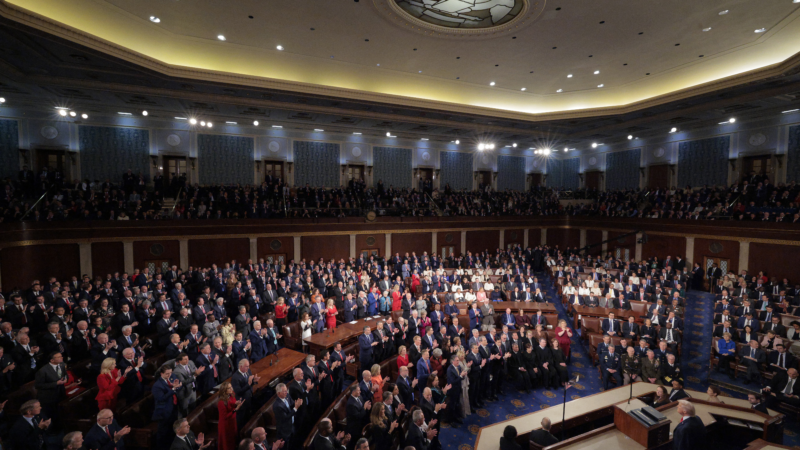Trump’s trade war is raising money for the government, but at whose expense?
President Trump has been promising his tariffs will help make America more prosperous.
There’s already evidence that tariffs are helping the government’s bottom line. The federal government collected $68.9 billion in tariffs and excise taxes during the first five months of the year, according to Treasury Department data collected by the Bipartisan Policy Center.
That’s a 78% increase from the same period a year ago. Much of the additional revenue came in April and May, after Trump imposed tariffs of at least 10% on nearly everything the U.S. buys from other countries.
But whether the tariffs are making Americans more prosperous is another question. The tariff windfall isn’t coming out of thin air. Nor is it being paid by foreign governments, as Trump often argues.
Tariffs revenue is coming from Americans’ pockets
The tariffs are mostly being paid by American businesses and families.
“It’s a tax on the backs of people who are importing either raw materials or, in my case, wine” says Patrick Allen, a Columbus, Ohio-based importer who sells French wine throughout the country. “And eventually it gets built into the price everybody is paying for goods.”

If tariffs stick, they can shave off trillions in federal debt
There’s a silver lining: The non-partisan Congressional Budget Office (CBO) projected that if Trump’s tariffs were to remain in place for a full decade, they could shave $2.8 trillion off the federal debt.
The White House touted that forecast as a partial answer to the additional debt that would be racked up by the president’s tax cuts in the sweeping Republican bill that passed the House last month.
But the CBO also acknowledged that the tariffs will result in higher inflation this year and next, as well as slower economic growth.
The overall drag on the economy is hard to estimate, because the U.S. hasn’t had tariffs this high since the Great Depression era. But some experts think the damage could be substantial.
“Some are forecasting larger impacts and potentially pushing us into recession,” says Shai Akabas, vice president of economic policy at the Bipartisan Policy Center. “We won’t know until we see the fallout.”
Thousands of jobs cut in manufacturing
A survey from the Institute for Supply Management suggests tariffs are a substantial drag on the manufacturing sector, which cut 8,000 jobs last month.
“Most suppliers are passing through tariffs at full value to us,” a purchasing manager of a chemical factory said in the report. “The position being communicated is that the supplier considers it a tax, and taxes always get passed through to the customer.”
One big issue for business owners: cash flow
For importers like Allen, tariffs are also a cash-flow challenge, because he has to pay the tax in advance, before making any sales.
“Say if I order $100,000 of wine from France, if there’s a 20% tariff, I’ll have to pay $20,000 to get the wine out of customs before I sell a bottle,” Allen says.
Trump initially announced a 20% tariff on imports from the European Union. He later reduced that to 10% for a 90-day period, but has since threatened to increase the tariff on European goods to 50%.
Allen would typically be ordering wine now to sell in the fall and the run-up to the Christmas holidays. But many of his customers are sitting on their hands because they have no idea what the tariff will be.
“Importers are afraid. They don’t know when the other shoe is going to drop,” Allen says. “We’re going to be out of stuff on the shelves. But the thing is, all of those out-of-stocks on the shelves represent money we would have been making that we won’t be making.”
Customs broker Margie Shapiro used to pay tariffs in advance for her clients and collect the money later, which was possible when the average tariff rate was under 3%. With today’s much higher levies, she can’t front the cost any more and importers are having to make those payments themselves.
“If you throw a monkey wrench into it like this, a lot of people are probably going to go out of business,” Allen says. “At the very least, I have wine I can drink here to soothe myself.”
When a horse whinnies, there’s more than meets the ear
A new study finds that horse whinnies are made of both a high and a low frequency, generated by different parts of the vocal tract. The two-tone sound may help horses convey more complex information.
Trump’s many tariff tools mean consumer prices won’t go down, analysts say
The Supreme Court struck down President Trump's signature tariffs. But the president has other tariff tools, and consumers shouldn't expect cheaper prices anytime soon, economists say.
Hundreds of American nurses choose Canada over the U.S. under Trump
More than 1,000 American nurses have successfully applied for licensure in British Columbia since April, a massive increase over prior years.
Tax credits for solar panels are available, but the catch is you can’t own them
Rooftop solar installers are steering customers toward leases instead of purchases. Federal tax credits for purchased systems have ended but are still available for leased ones.
5 takeaways from Trump’s State of the Union address
President Trump hit familiar notes on immigration and culture in his speech Tuesday night, but he largely underplayed the economic problems that voters say they are most concerned about.
China restricts exports to 40 Japanese entities with ties to military
China on Tuesday restricted exports to 40 Japanese entities it says are contributing to Japan's "remilitarization," in the latest escalation of tensions with Tokyo.







